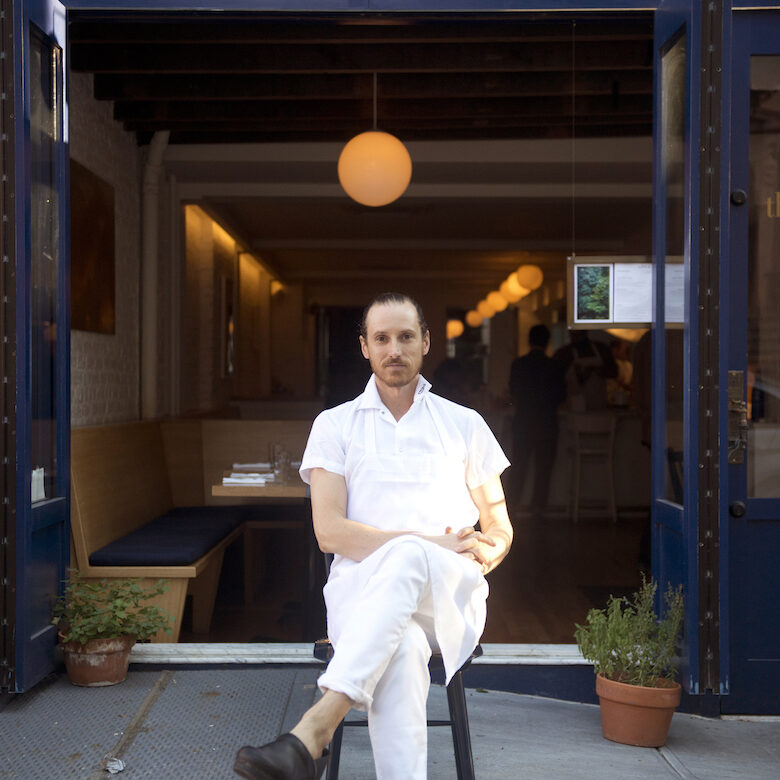
Chef Gabe McMackin earned his fame (and Michelin star) at The Finch in Clinton Hill, Brooklyn, but the stones of his foundation come from points farther north: Northwestern Connecticut, Saratoga, and at Blue Hill at Stone Barns in Pocantico Hills. In McMackin’s words, during his career he’s bounced all around the Northeast, but really, he was just “zeroing in on Amenia.”
While still heading up The Finch, McMackin is expanding his culinary footprint by taking on the kitchens at Troutbeck, a rolling, garden-studded estate in Amenia with a history that’s remarkable even for the Hudson Valley. Under the stewardship of activist owners, the centuries-old homestead was a hotbed of progressive thought and letters. Mark Twain, W.E.B DuBois, Henry David Thoreau, Ralph Waldo Emerson, Langston Hughes, Ernest Hemingway, and Sinclair Lewis all spent time under its snug slate roof. In 1913, Troutbeck was the site of the Amenia Conferences that led to the formation of the NAACP.
Time had not been kind to the august structure. It had been limping along as a faded resort until 2016, when Montreal-born artist, real estate developer, and hotelier Anthony Champalimaud took it over with his wife, Charlie. After a total revamp, Troutbeck’s 37 guest rooms have been restored to their former glory with respectful upgrades and Frette linens, while a spa and wellness center is set to be launched on the property this year. Happily, Troutbeck’s restoration was no broad-strokes job. The Champalimauds kept many of Troutbeck’s original features, including architectural elements, furniture, even its gloriously Mid-Century pool.
Travelers on Metro-North’s Harlem Line can reach Amenia’s Wassaic Station from Grand Central in a little more than two hours, which may explain the cross-current of clientele between The Finch and Troutbeck. Says McMackin, “In Brooklyn, we have weekenders or people with summer homes, and we have guests that come down from the Hudson Valley and Northwestern Connecticut—certainly people from Westchester.” He continues, “So, I do feel that it is literally the same people, the same community, that are supporting what we do at The Finch and what we do at Troutbeck.”

It’s obvious that the Hudson Valley has been retooling for the resurgence of the tourism industry, but McMackin notes that New York City is changing, too. “The cost of operating a business in New York City and Brooklyn—or anywhere, period—has just become incredibly challenging. So, I think some restaurant people are realizing that they can live a more balanced lifestyle outside of New York City while still connecting with diners who are interested in well-sourced ingredients and local agriculture.” McMackin continues, “These are the same values that—10–15 years ago—were held only in limited spaces or among audiences that were primarily in NYC. Nowadays, there’s a lot more interest further out.”
McMackin is quick to contrast his work at Troutbeck and The Finch with other Hudson Valley restaurants that might be the tenth or fifteenth restaurant opened by a hospitality group under a celebrity chef’s name. “When you look at that tenth restaurant, there is a totally different rhythm. The Finch is a fully independent restaurant put together by me, my family, and some friends—it’s all heart and soul.” He continues, “I’ve been lucky enough to work on this project at Troutbeck with a group of extraordinary people that I also feel are family. For me, Troutbeck is an opportunity to operate under the same principles, beliefs, and ideals—you know, the need to connect with our place and time and sources—and reach not only someone from the neighborhood who wants to come in for dinner, but also a global citizen who stays for a week.”



